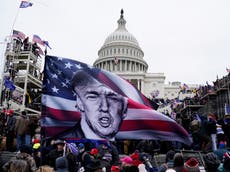Americans protest Publix grocery chain heiress who donated $300,000 to Trump rally
The grocer has been at the centre of partisan donation criticism in the past
Your support helps us to tell the story
From reproductive rights to climate change to Big Tech, The Independent is on the ground when the story is developing. Whether it's investigating the financials of Elon Musk's pro-Trump PAC or producing our latest documentary, 'The A Word', which shines a light on the American women fighting for reproductive rights, we know how important it is to parse out the facts from the messaging.
At such a critical moment in US history, we need reporters on the ground. Your donation allows us to keep sending journalists to speak to both sides of the story.
The Independent is trusted by Americans across the entire political spectrum. And unlike many other quality news outlets, we choose not to lock Americans out of our reporting and analysis with paywalls. We believe quality journalism should be available to everyone, paid for by those who can afford it.
Your support makes all the difference.Some Americans say they are boycotting the grocery chain Publix after it was revealed that a member of the company's founding family donated $300,000 to the Trump rally that preceded the Capitol insurrection.
The Wall Street Journal reported that Julie Jenkins Fancelli, an heiress to the Publix grocery chain, donated $300,000 to the "Save America" rally that preceded the attack by Donald Trump supporters on the US Capitol.
Her contribution to the rally made up the majority of its funding, which cost $500,000, according to the event's facilitator and infamous conspiracy theorist Alex Jones.
The insurrection left five dead and resulted in the second impeachment of Mr Trump.
Ms Fancelli has been a prominent donor for Mr Trump; she gave nearly $1m to the former president's 2020 re-election campaign.
On Saturday, the hashtag #BoycottPublix began trending on Twitter as shoppers responded to the news of Ms Fancelli's donations.
"My family is boycotting Publix indefinitely," Twitter user Geoffrey Martin wrote.
Another user, named Annette, said she would be taking her business elsewhere.
"Dear @TheFreshMarket, please thank the @Publix heiress for the $1,000/month I will now be spending at your place of business instead of hers," she wrote. "I don't believe in patronizing businesses that support domestic terrorism and white supremacy groups. Warmest regards, Annette."
Publix issued a statement attempting to distance itself from the heiress.
"Mrs Fancelli is not an employee of Publix Super Markets, and is neither involved in our business operations, nor does she represent the company in any way. We cannot comment on Mrs Fancelli's actions," the grocery chain said in a Twitter statement.
The company then condemned the attack on the Capitol.
"The violence at the Capitol on Jan 6 was a national tragedy. The deplorable actions that occurred that day do not represent the values, work or opinions of Publix Super Markets," it said.
Despite the statement, this is not the first time the Floridia-based grocer has landed in the centre of controversy for its political donations.
Shortly after the Parkland school shooting, which took place in Florida, the company halted political donations. It had been supporting Adam Putnam, a candidate running for governor who billed himself as a "proud National Rifle Association sellout."
In response to the grocer's support, David Hogg, one of the survivors of the school shooting, led "die-ins" at Publix supermarkets protesting the company's $670,000 donation to Mr Putnam's campaign via a PAC.
The company also donated money to support Republican Governor Ron DeSantis, who led Florida's coronavirus relief efforts and who has been accused of intentionally misreporting virus data in an effort to improve Mr Trump's chances at re-election.







Join our commenting forum
Join thought-provoking conversations, follow other Independent readers and see their replies
Comments